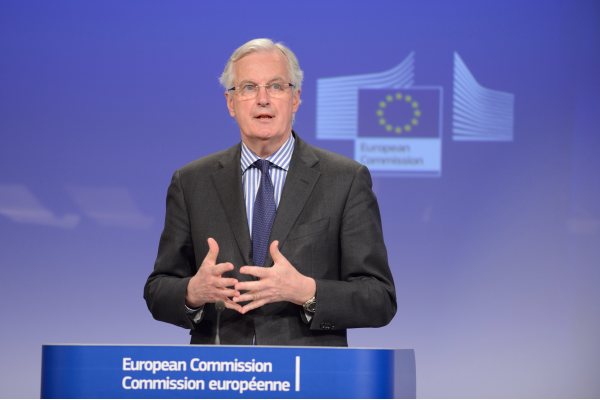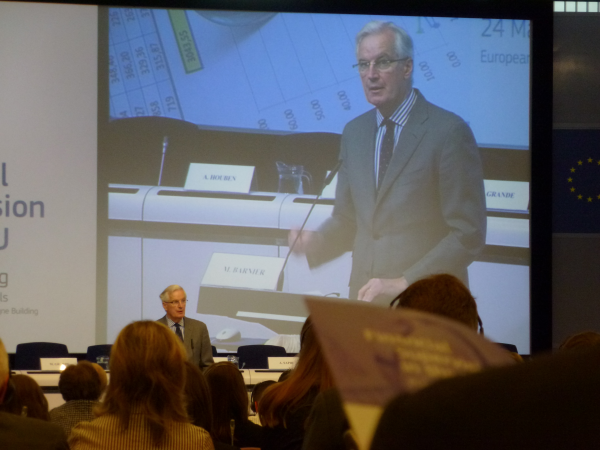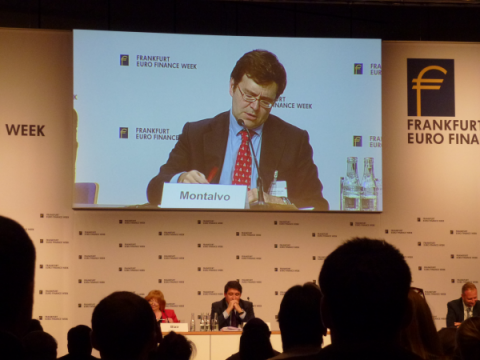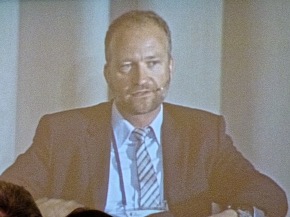![]() Michel Barnier, European Commissioner for Internal Market and Services, responds to written questions from Gideon Benari, Editor of Solvency II Wire about the Omnibus II trilogue agreement, the relationship with industry and the future of the process after the European Elections. Solvency II Wire: No doubt some of the problems encountered in Omnibus II are a result of the length of the process and delays. What can be done to speed up the regulatory process?
Michel Barnier, European Commissioner for Internal Market and Services, responds to written questions from Gideon Benari, Editor of Solvency II Wire about the Omnibus II trilogue agreement, the relationship with industry and the future of the process after the European Elections. Solvency II Wire: No doubt some of the problems encountered in Omnibus II are a result of the length of the process and delays. What can be done to speed up the regulatory process?  Michel Barnier: The Solvency II project was conceived in a period of economic growth and financial stability. However, at the time it was adopted (November 2009), the global economy had just undergone an unexpectedly severe crisis. This required a reconsideration of the framework in order to include – through the “Omnibus II” Directive – some important countercyclical and transitional measures to preserve the financial stability of the insurance sector. A carefully balanced package was agreed by the trilogue parties in November 2013, and the application date for Solvency II was set at January 2016. A big milestone for the Solvency II project was passed with the adoption of Omnibus II. From a political point of view, this was a major success for all parties involved. Looking forward, the next milestone is the Commission’s adoption of the Solvency II Delegated Acts, planned for this summer, followed by a three-month objection period for Council and the European Parliament. We are confident that this process will involve no further delays, as we are in the process of finalising the text, which has been discussed extensively with the Member States and with Parliament representatives. All parties involved know that the Delegated Acts need to be in force by March 2015 to enable application of Solvency II in January 2016, and all are showing strong commitment to avoiding further delays. SIIW: In your opinion was there too much involvement of industry lobbying in the drafting of Omnibus II and what can be done to ensure the co-decision legislative process incorporates industry feedback in a productive way and does not leave the system overly vulnerable to demands from special interests? MB: The Omnibus II negotiations were a long and complex process during which a carefully balanced outcome was agreed. The co-decision legislative procedure allows for the consideration of the impact on the industry concerned, where necessary, in the impact assessment. The measures approved in the so-called Long-Term Guarantees package were designed to address the main concerns that the Solvency II regulation could endanger the financial stability of the insurance industry or discourage insurers from launching long-term products, which are of considerable social importance. We have used information from industry to design and calibrate the new system, but we have always been careful to ensure that such contributions to the factual basis for decision-making is clearly distinguished from the political decisions themselves in the trilogues which must not be influenced by industry. SIIW: How has the work on Omnibus II (and drafting other financial services industry regulation) affected the nature of the relationship between the European Parliament, Council and the Commission? How might this be reflected after the elections to the European Parliament? MB: The interaction between the three institutions increased significantly, particularly over the period of the Omnibus II negotiations, which involved a series of fruitful trilogue meetings. Engagement has also remained high following agreement on Omnibus II in the work of the expert group to prepare the Delegated Acts. Compared to the work on Level 2 acts prior to Omnibus II, the delegated acts have to be adjusted in particular to changes in the legal empowerments set out in Omnibus II – a number of which relate to the Long-Term Guarantees package. Other amendments are also being considered to stimulate high quality long-term investment in line with the Commission’s Green Paper and communication on the long-term financing of the European economy. The Delegated Acts are being drafted with the aim of stabilising the political agreement. We must of course be very careful not to shift the balance reached in the Omnibus II agreement. SIIW: One of the main problems with the Long-Term Guarantees debate was that it mixed highly technical matters with political demands. How can this be managed more effectively in the future? MB: That complexity is always going to be there in financial regulation. Extensive technical advice and discussions within the expert groups are the right way to tackle it, and we have followed that approach to date. The more technical the issues, the more technical support is required in order to reach a sound agreement. — To subscribe to the Solvency II Wire mailing list for free click here.
Michel Barnier: The Solvency II project was conceived in a period of economic growth and financial stability. However, at the time it was adopted (November 2009), the global economy had just undergone an unexpectedly severe crisis. This required a reconsideration of the framework in order to include – through the “Omnibus II” Directive – some important countercyclical and transitional measures to preserve the financial stability of the insurance sector. A carefully balanced package was agreed by the trilogue parties in November 2013, and the application date for Solvency II was set at January 2016. A big milestone for the Solvency II project was passed with the adoption of Omnibus II. From a political point of view, this was a major success for all parties involved. Looking forward, the next milestone is the Commission’s adoption of the Solvency II Delegated Acts, planned for this summer, followed by a three-month objection period for Council and the European Parliament. We are confident that this process will involve no further delays, as we are in the process of finalising the text, which has been discussed extensively with the Member States and with Parliament representatives. All parties involved know that the Delegated Acts need to be in force by March 2015 to enable application of Solvency II in January 2016, and all are showing strong commitment to avoiding further delays. SIIW: In your opinion was there too much involvement of industry lobbying in the drafting of Omnibus II and what can be done to ensure the co-decision legislative process incorporates industry feedback in a productive way and does not leave the system overly vulnerable to demands from special interests? MB: The Omnibus II negotiations were a long and complex process during which a carefully balanced outcome was agreed. The co-decision legislative procedure allows for the consideration of the impact on the industry concerned, where necessary, in the impact assessment. The measures approved in the so-called Long-Term Guarantees package were designed to address the main concerns that the Solvency II regulation could endanger the financial stability of the insurance industry or discourage insurers from launching long-term products, which are of considerable social importance. We have used information from industry to design and calibrate the new system, but we have always been careful to ensure that such contributions to the factual basis for decision-making is clearly distinguished from the political decisions themselves in the trilogues which must not be influenced by industry. SIIW: How has the work on Omnibus II (and drafting other financial services industry regulation) affected the nature of the relationship between the European Parliament, Council and the Commission? How might this be reflected after the elections to the European Parliament? MB: The interaction between the three institutions increased significantly, particularly over the period of the Omnibus II negotiations, which involved a series of fruitful trilogue meetings. Engagement has also remained high following agreement on Omnibus II in the work of the expert group to prepare the Delegated Acts. Compared to the work on Level 2 acts prior to Omnibus II, the delegated acts have to be adjusted in particular to changes in the legal empowerments set out in Omnibus II – a number of which relate to the Long-Term Guarantees package. Other amendments are also being considered to stimulate high quality long-term investment in line with the Commission’s Green Paper and communication on the long-term financing of the European economy. The Delegated Acts are being drafted with the aim of stabilising the political agreement. We must of course be very careful not to shift the balance reached in the Omnibus II agreement. SIIW: One of the main problems with the Long-Term Guarantees debate was that it mixed highly technical matters with political demands. How can this be managed more effectively in the future? MB: That complexity is always going to be there in financial regulation. Extensive technical advice and discussions within the expert groups are the right way to tackle it, and we have followed that approach to date. The more technical the issues, the more technical support is required in order to reach a sound agreement. — To subscribe to the Solvency II Wire mailing list for free click here.
 Michel Barnier European Commissioner for Internal Market and Services, speaking at the Public Hearing on Financial Supervision in the EU, Brussels May 2013.[/caption]
Michel Barnier European Commissioner for Internal Market and Services, speaking at the Public Hearing on Financial Supervision in the EU, Brussels May 2013.[/caption]
[adsanity id=1583522 align=aligncenter /]]]>








